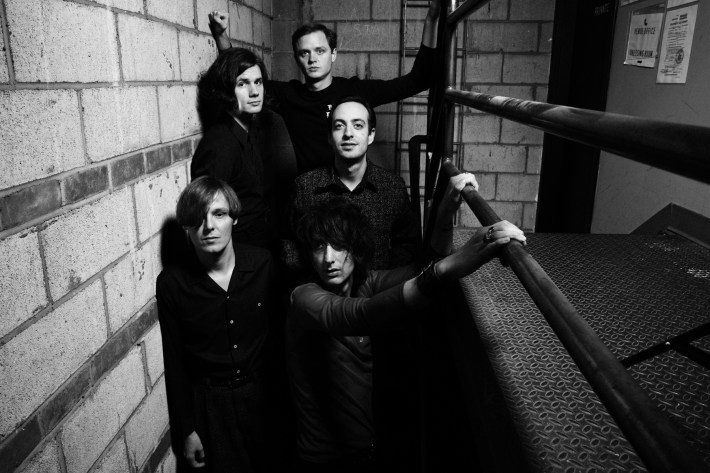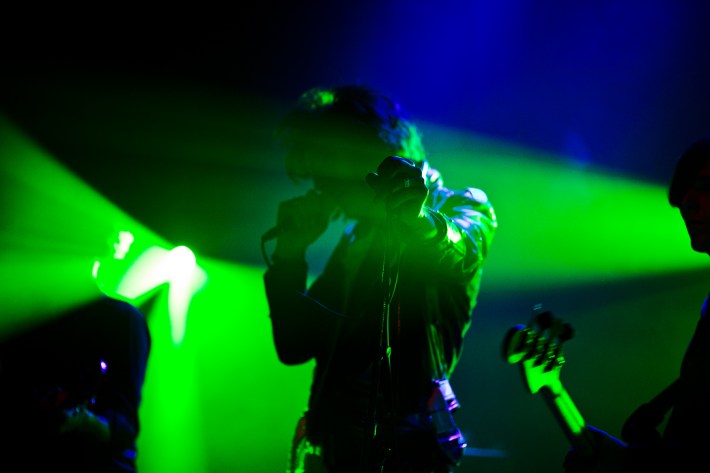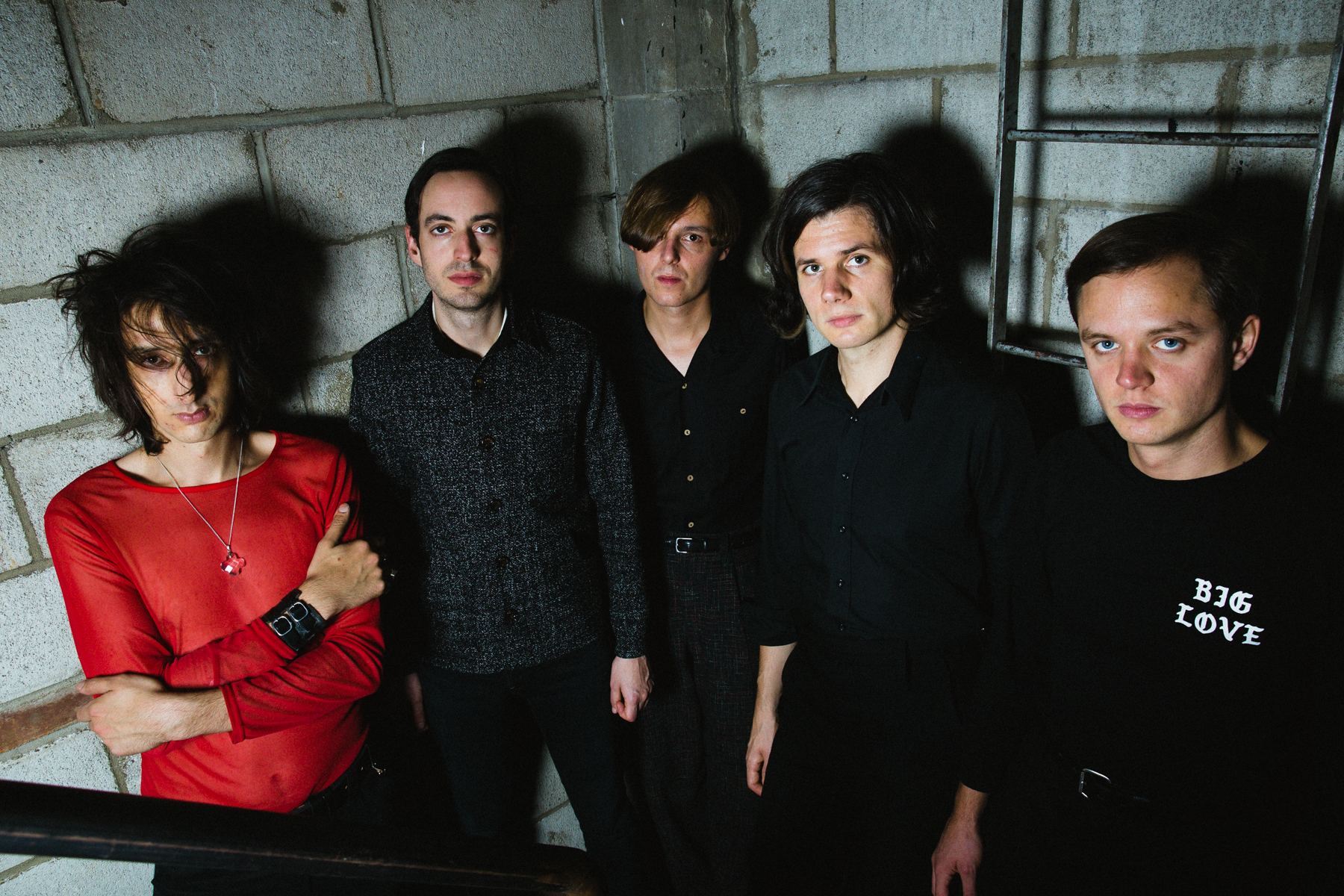It's hard to place Faris Badwan. There's the fact that his name alone sounds exotic. There's the fact that his demeanor is some improbable mix of stoned, moody detachment and wired, up-all-night intensity. He speaks in a wispy, wandering murmur that could equally signal boredom, mild frustration, aloofness, or reflection. And, obviously, there's the way he looks. Much has been made of Badwan's appearance over the years, but it bears repeating: A tall, sinewy figure, he sort of looks like a gothic and leather-jacketed scarecrow in his latest, early 30s iteration. His eyes, when not obscured by his hair, alternate between half-lidded sleepiness and the wide, darting gaze of someone who's been awake for two days partying (or, rather, reading). Overall, he halfway looks like a survivor of a different rock 'n' roll spirit, perhaps a stranger cousin of mid-'00s Julian Casablancas. And yet, he never looked like he belonged then, either. He appears, mostly, outside of a specific time or location, an amalgamation of vague and blurred reference points that come together into something that feels familiar yet without a concrete precedent.
Much of that could also be said for the Horrors, the band Badwan fronts. Also including guitarist Joshua Hayward, keys/synths player Tom Furse, bassist Rhys Webb, and drummer Joe Spurgeon, the group appeared 10 years ago with debut Strange House. Between its scuzzy Halloween punk and the flamboyantly gothic aesthetic favored by the individual members of the band back then, it came across as almost campy in its overdriven darkness. They could've disappeared after that, like so many British buzz bands of the '00s -- one distinct and divisive debut then never heard from again. But that wasn't how it went for the Horrors. In those ensuing 10 years, they've become one of the modern rock acts most adept at shape-shifting, abruptly informing everyone that no, really, you should take these guys seriously with 2009's krautrock-infused Primary Colours, crafting a contemporary masterpiece of meditative Technicolor psychedelia in 2011's Skying, then doubling-down on that vein for the dancier, synth-drenched Luminous in 2014.
Throughout, they never really belonged anywhere. The Horrors didn't seem like part of a scene, and no bands really followed them sonically; they exist off to the side of any major narrative you can apply to 21st century rock music or British music scenes of the last 10 years. Whether in visual or musical aesthetic, they've harvested liberally from new wave, shoegaze, various eras of electronic music, post-punk, and Britpop, collapsing it all together into their own idiosyncratic interpretations. Now, they're back again with their fifth album V -- another strong entry in one of this century's more underrated catalogs, another album where the Horrors continue to be on their own trip.
A few hours before their second night playing at record store/venue hybrid Rough Trade's Brooklyn outpost, Badwan and Hayward are hanging at a booth in a nearby bar. It's the kind of room you'd imagine the Horrors to always be killing time in: shadowy thanks to dim lighting broken by heavy orange lamps, all heavy wood and wallpaper and portraits that collectively look like they're from the 19th century. Hayward is paging through a copy of Minority Report, a collection of short stories by the famous sci-fi author Philip K. Dick. Between Hayward's sci-fi interests and Badwan's re-reading of the canonical Neuromancer, a bit of sci-fi seeped into V thematically and visually -- as usual, the Horrors created some other world, one that looks mostly like ours but feels slightly skewed.

"We’re not really that interested in the more mundane aspects of day-to-day life," Badwan explains. "Obviously, those things always influence. It’s more interesting to find another way to filter them through. I don't want to dress it up or make it more grand than it is, but I feel like I perceive a lot of things differently than everyone. Maybe I have a slightly warped take on reality."
The meaning behind the title of V would seem simple enough, a fifth album emblazoned with the Roman numeral for five. But for the Horrors, it means a few other things. The physical shape of the V also stands for a "triumphant 'fuck you'" according to the band, given the middle finger-type meaning of the V hand gesture in England. "When people or bands think they have something to prove or they feel like they want to say 'fuck you' to an unidentified source, it's just as much of a 'fuck you' to themselves, you know?" Badwan says. "Like fuck you for not thinking we were going to make this record."
"It's many things, isn't it?" Hayward adds. "A friend of ours commented on how Vs represent birth. A rebirth. A new beginning."
The "rebirth" and the "triumphant 'fuck you'" are linked. As Badwan describes it, V is the result of the band surviving and coming out on the other side of a "testing period." Luminous, the album's predecessor was quietly respected but not overly praised by some critics, its lush and melancholic prettiness seemingly a mark of aesthetic achievement without emotional resonance. It was also the first time the Horrors had stayed in a similar gear. Its gauziness and moody psychedelia felt like an extension of Skying, not a nearly complete reinvention, as Skying had been from Primary Colours and Primary Colours had been from Strange House. Seemingly not a band that often consciously takes stock of their standing in the world, the Horrors themselves did come out of the era thinking something was missing.

Badwan's opinion of the problem between Luminous and Skying actually echoes that of the former's detractors. "Maybe we let ourselves go into our comfort zone with the way we wrote, and though I like a lot of the songs on Luminous, I feel like we didn't shake things up enough in terms of the way the record was made," Badwan explains now. "There was maybe a bit of a spark missing, the edges were softened." In hindsight, his real hangup was the way the record was presented, asserting the artwork and surrounding designs were too "safe."
On the other end of that, there was the testing period, a time where the band gradually realized the working patterns they had to shake up in order to get back that sense of the Horrors constantly re-envisioning themselves. They got rid of their studio -- "It had become claustrophobic," as Badwan puts it. It wasn't a productive environment anymore, nor was the approach of producing themselves, as they had for several records. "No one felt like they were having a good time," Badwan says of that era. "Probably a few people felt like they maybe didn't want to do the band anymore." In response, they altered the parameters of the songwriting process once more, and they brought in producer Paul Epworth, a man recently famous for his pop-oriented work with Adele, U2, and Coldplay, but whose post-punk and dance-leaning roots place him closer to the Horrors' own interests than one might initially expect.
Balanced out by Epworth's tendency towards quick vetoes if something wasn't working immediately, the band wrote something like 60 songs for the album that would become V. "If anyone had told me when we first started that we'd write more than the bare minimum of songs needed to make a record, I'd be surprised,” Badwan deadpans, before clarifying that some of those 60 songs were "rubbish" and, perhaps, some would one day be revisited. There were left turns in the process, like when Badwan and Webb decamped to Iceland so Badwan could get a breath of fresh air after spending two weeks driving himself crazy obsessing over one lyric. "We had never been to Iceland," Badwan says. "It's nature’s version of industrial. It’s metallic landscapes." Which, it turns out, became an apt way of describing the nature of V: an album that maintains the Horrors' ethereal nature while relying on a more aggressive tone and texture.
The goal was something "dramatically different" from Luminous. Hence, its more lurid imagery, something Badwan considers "not what you'd imagine to come from us." "After the record was finished, that's the only thing I remember discussing," Badwan says. "'OK, we definitely want to put out a song that's far away as possible first.'" So they released V's lead single, "Machine."
A combination of an insistent yet seasick forward momentum and acerbic guitars and synths, "Machine" stayed true to its name and found the Horrors adopting a sound almost reminiscent of industrial. That mechanistic, dystopian sci-fi quality runs through a lot of the album's other tracks, too, from the unnerving throb of “Hologram” to tracks like "Press Enter To Exit" and "Point Of No Reply." The latter examples at first seem like extensions of spaced-out excursions from past Horrors records, but that melancholia that defined much of Luminous and Skying has been replaced by something more foreboding and haunting. Synths and guitars are deployed more aggressively, acidic and violent compared to the oscillating beauty of Luminous. When the Horrors maintained their own studio, they would explore the depths of a single sound, but here there was a conscious effort on the band's part to reclaim a part of their identity that had been mostly confined to the live show in recent years. "All of the bits we recorded are second or third takes," Hayward explains. "I think that’s where the heaviness comes from. It’s very instinctual, this record." Meanwhile, moodier numbers like "Ghost" and "Weighed Down" are a far cry from the other-dimension balladry of something like Skying highlight “Still Life"; rather, they are frayed and damaged around the perimeter, the sound of corroded retro-futuristic machinery.
As promised, then, much of V is uglier than anything the Horrors had been up to in recent memory. And while Luminous is a much better record than perhaps even the band members would currently acknowledge or than framing the narrative of V in this manner might suggest, the newest shift in the Horrors' sound does seem like a necessary rebirth. All those sharper or gnarlier songs almost come across as the band willfully sawing at the intricate glossiness they'd previously perfected. For Horrors fans, that's what would make V a dark but ultimately engaging chapter in the band's work.
Part of what makes it that way is where the album takes you by the end. The pulsations and propulsion of "World Below" mark one of the album's more infectious moments, a jostling and restless track that starts to signal a parting of V's storm clouds as Badwan sings of "bright lights overhead." The real stunner, though, is closer "Something To Remember Me By," the kind of track that comes in out of nowhere at the end of a record and completely recontextualizes everything you just heard. The trademark epic for this particular Horrors outing, it has a buoyancy and runaway catchiness of the sort that the Horrors have rarely played with. Out of a few songs on V that could rank with the Horrors' finest, "Something To Remember Me By" is by far the front-runner.
Even in light of all that, the idea of the Horrors themselves latching onto the idea of V as a rebirth is at first confusing. It's 10 years after their debut, and they've covered a lot of ground on their five records, often exploring more styles and moods in a single album than some other bands might take on across their career. Over the years, that constant drive to reshape it all must become trickier, and that's one place where Badwan acknowledges the passage of time. "When you first make a record, you're like 'This is great, we're in a band playing instruments, how did anyone let us get away with this,'" he remembers. "You feel like you're tricking everyone, snuck in the door and grabbed someone else's equipment."
For the Horrors specifically, part of that may have come with the exact nature of Strange House. The buzz surrounding their debut was a confused one. They were supposed to tour America with Black Rebel Motorcycle Club, but instead wound up on the road with a band that, in their words, did a "mini-My Chemical Romance thing." Badwan knows it could've gone the other way easily enough, that they could've not made it to a second album and they'd simply be remembered as this goofy one-off British buzz band. But if you ask him when the turning point was, when he realized this wasn't a farce and they could keep this thing going, he'll deadpan something like: "I'm aware that we're in a band. My perception of reality isn't that warped."

They're not a band that's big on looking back, or of taking stock of what they've put together in the last 10 years. "I don't even listen to our records," Hayward says. "Once you release them, they're not for you anymore, they're for everyone and it becomes very different."
"Thats the way it should be, though," Badwan adds. "There is no ownership."
The same result arises if you ask them about any of the characteristics that have, at times, been used to write the band off. The description of the Horrors' genre-hopping tendencies making them a "record collector band" -- presumably a term of derision suggesting good taste in crate-digging automatically negates any chance at originality -- prompts Hayward to ask, "Are there bands who don't like music?" and Badwan to incredulously sneer "Doesn't every band collect records? I fucking hope so." The idea that the Horrors' otherworldly depictions work as escapism yields a debate between the two about what escapism even means, before each defends it in their own way. Hayward returns to his love of dystopian sci-fi, the idea of a work of art with its own set of rules that allows you to get at some kind of truth about humanity in a different context. "Taking you out of yourself, you can see yourself," he says. "That's what it's doing."
"People need escapism," Badwan adds. "Without it, they'll go nuts. It's a necessity. Whether it's a vice or not, you need something to allow your brain to recharge. You can't do it otherwise."
In the end, V doesn't clarify anything about the Horrors any more than their past releases. The album merely adds another wrinkle to an already elusive group, a band that has always been hard to pin down and continues to add further deflections to their arsenal, all while continuing to write music at a consistently high level. And that, if there's anything conscious behind what they do at all, seems to basically be the point.
“We've never given thought to what record we're going to make, what we want to achieve, what we're doing, we don't give any thought to anything,” Badwan says. "None of that stuff matters." In the end, all that does matter is that 10 years and five albums deep the Horrors remain restless, searching, inscrutable. That they've come back once more and, just like the last time, you can just barely recognize them.
//
V is out now on Caroline/Wolf Tone. Purchase it here.






